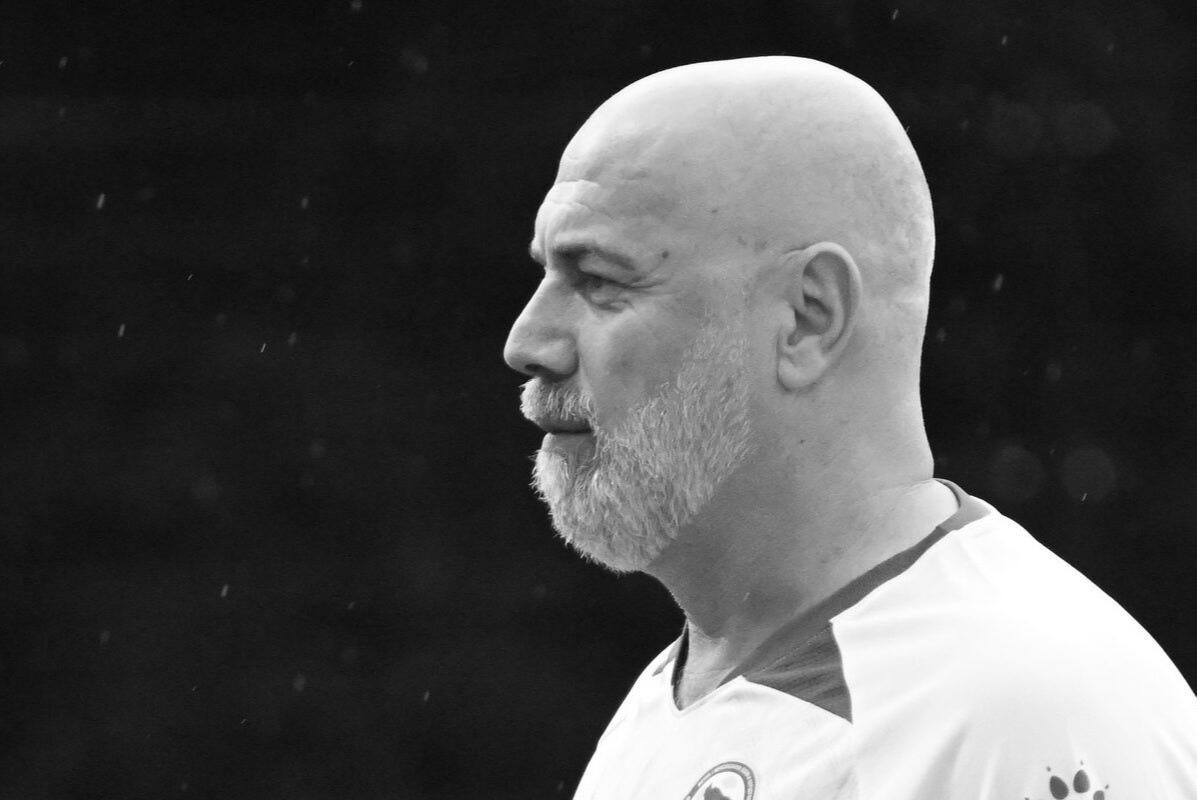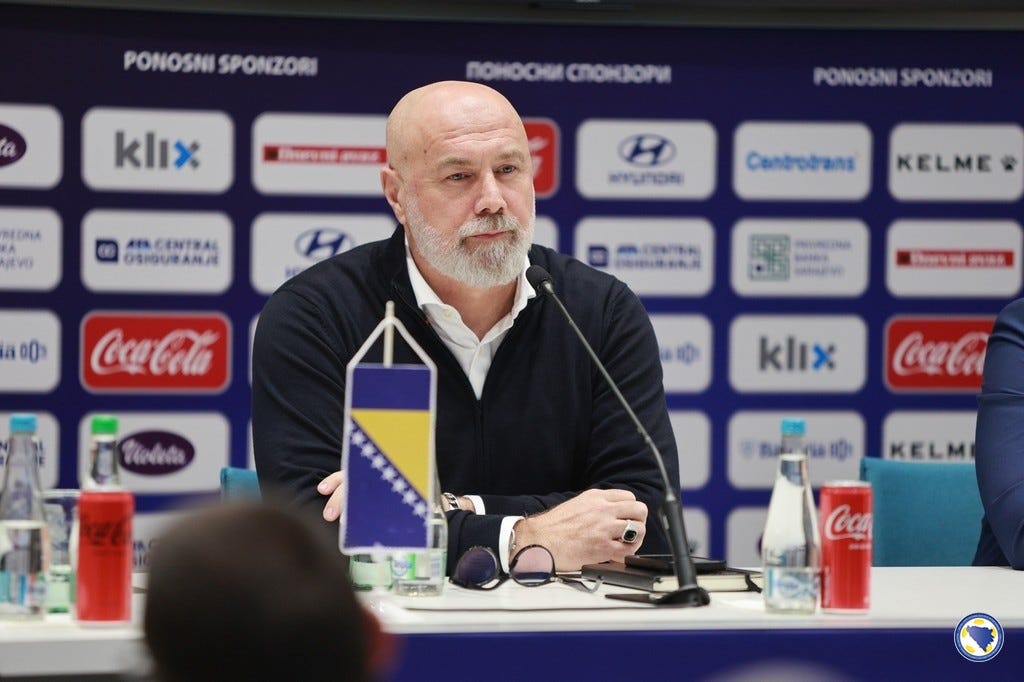The Coach Trying to Heal Bosnia’s Wounds
Ahead of a pair of crucial World Cup qualifiers, Nadan Hadzic writes about football's role in Bosnia Herzegovina—a country still healing from the wounds of war.
Welcome to Sports Politika, a media venture founded by investigative journalist and researcher Karim Zidan that strives to help you understand how sports and politics shape the world around us. My mission is to offer an independent platform for accessible journalism that raises awareness and empowers understanding.
If you share this vision, please consider supporting my work by becoming a paid subscriber. I am currently running a special offer whereby you can secure a subscription at a 40% discounted price…forever.
As the November fog descends over the industrial town of Zenica in Bosnia-Herzegovina, the floodlights of the Bilino Polje Stadium cut through the mist, illuminating a night burdened by the weight of expectation. Bosnia Herzegovina’s national team coach Sergej Barbarez takes his place in the dugout at a ground where he wore his country’s captain’s armband time and again, knowing his nation now has a momentous sporting achievement that eluded him as a player within its grasp: a place at the 2026 FIFA World Cup.
Few national team coaches can boast as colourful a career as Sergej Barbarez. After spending much of his post-playing career on Europe’s professional poker circuit, in 2024, fourteen years on from completing his coaching badges, he was given his first ever managerial position and the most prestigious in the land: the national team’s top job. Upon being appointed, Barbarez’s stated objective was qualification for Euro 2028, but eighteen months into his reign, Bosnia-Herzegovina may soon be holding a winning hand.
Victories over Romania and Austria this coming week will guarantee their place at the World Cup, for what would be only their second appearance at a major tournament for a country still healing from the 1992-1995 Bosnian War, in which around 100,000 people were killed and over 2 million people were left displaced.
Barbarez is hampered by daunting obstacles, such as the severe lack of investment in the domestic game, which obliges the national team to rely on scouting players from the diaspora. Not a single member of the current 24-man squad plays for a Bosnian club, and as many as seventeen players were born abroad, with twelve having previously represented another country.
Barbarez brought some of his former teammates from the national team into his coaching staff, and they have received praise for their effective recruitment of young, gifted players from the Bosnian diaspora and rebuilt morale in the camp. The squad’s average age is one of the lowest in Europe, but their captain and stalwart is the seemingly evergreen 39-year-old Edin Dzeko, who made his international debut in 2007 before one of the team’s newest talents, Kerim Alajbegovic of Red Bull Salzburg, was even born.
Revered as a national icon in Bosnia-Herzegovina, Barbarez is lauded not only for his footballing achievements but for his leadership and statesmanlike persona. During a highly-charged, decisive World Cup qualifier against Serbia & Montenegro in 2005, with a place at the finals on the line, violence erupted on the terraces and overshadowed the game. Barbarez famously remonstrated with the referee that the game should be abandoned amid the unrelenting crowd trouble. On a night where the national team had a historic triumph within its sights, the spotlight turned to matters away from football.
Thirty years on from the end of the war, football is symptomatic of the issues modern-day Bosnia-Herzegovina faces. The peace agreement that ended the war created a constitution that foments the divisions between the three ethnicities involved in the conflict – Bosniaks, Serbs and Croats.
The country has three presidents, representing each ethnicity, who rotate every 18 months. The Bosnian FA mimicked this system of three presidents until 2011, when FIFA and UEFA suspended Bosnia-Herzegovina as this arrangement was deemed to be against FIFA’s statute. Barbarez was chosen, alongside other legends of Bosnian football, to be part of the “Normalisation Committee” that FIFA set up. The ban was eventually lifted, with the Bosnian FA vowing to appoint a single president.
But even with a single president, the FA has not been short of problems, and the tenure of the current president, Vico Zeljkovic, has been shrouded in controversy. During the calendar year 2023, the national team had four different head coaches, which was unsurprisingly not conducive to any consistency on the pitch. But it was his decision to arrange a friendly with Russia in 2022, mere months after the invasion of Ukraine and the subsequent banning of Russia from FIFA and UEFA competitions, which incensed the fanbase the most. It was only once veteran players Edin Dzeko and Miralem Pjanic pledged a boycott that the game was called off. Zeljkovic’s uncle is Milorad Dodik, a Kremlin-aligned Bosnian Serb politician who has spent most of his political career undermining state institutions in order to push for the secession of the Serb-dominated part of the country to Serbia. Given that connection, cynics would argue that this meddling of politics into the game should come as no surprise.
Banners and chants calling for the FA to stand down are common at games, and it was recently reported that the leading organized fan group, BH Fanaticos, would be prevented from attending the upcoming qualifier against Romania by the FA. A new fan group, BH Hooligans, has been formed ahead of these games, and though there is little in the way of verified information about this group, it has been claimed the FA had a hand in their establishment. Suggestions the BH Fanaticos were denied tickets to the game against Romania have been dismissed by the FA, amid widespread shows of solidarity for the nation’s largest fan group from players and public figures alike.
The BH Fanaticos have nonetheless announced a boycott of the game as their long-standing feud with the FA shows no signs of abating. On the eve of one of the most significant moments in the nation’s football history, almost all of the media attention in Bosnia-Herzegovina has been focused on non-footballing issues.
As the players step out onto the pitch for these crucial World Cup qualifiers, they will stand to the country’s national anthem that is deprived of lyrics, because it was feared that the sentiments expressed would privilege one ethnic group over another. For a nation still searching for common ground, Barbarez has built a team defined by its togetherness.
As the country prepares to mark thirty years since the end of the war later this month, a place on the grandest stage of all in world football would serve as a rare reminder that unity, however fleeting, is possible in a divided country still bearing the wounds of war.
Sports Politika is a media platform focusing on intersection of sports, power and politics. Support independent journalism by upgrading to a paid subscription ( or gift a subscription if you already have your own). We would appreciate if you could also like the post and let us know what you think in the comment section below.






Very compelling article
Thanks for featuring guest articles like this. Good luck to Bosnia!!!